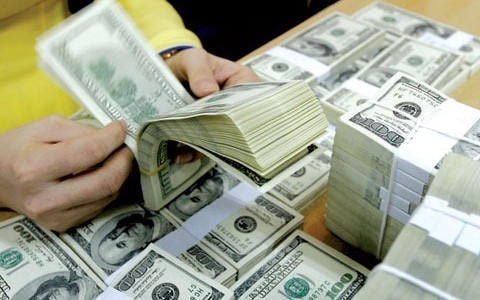State Bank: Not tightening foreign currency lending policy yet
The Governor of the State Bank said that the banking sector will continue to provide short-term foreign currency loans in 2018 to support production and business enterprises, especially export enterprises.
Reduce the cost of borrowing for businesses
The above information makes businesses "breathe a sigh of relief" because according to the regulations of the foreign currency lending policy in Circular 31/2016, the term is only until December 31, 2017. If the foreign currency lending policy is not continued, the cost of borrowing for businesses will increase significantly.
According to research, the USD lending interest rate at banks is currently commonly at 2.8 - 6%/year, depending on the term. Meanwhile, the lending interest rate for normal production and business sectors in VND is at 6.8 - 9%/year for short term; 9.3 - 11%/year for medium and long term. Therefore, when borrowing foreign currency, businesses are benefiting from the difference in USD/VND lending interest rates.
 |
| The banking sector will continue to provide short-term foreign currency loans in 2018 to support businesses. |
This means that businesses can borrow foreign currency at low interest rates and then sell it for Vietnamese dong to buy domestic raw materials, machinery and equipment. Then, businesses export goods to get foreign currency to pay off bank loans.
"If we cannot borrow foreign currency next year, businesses will have to borrow in Vietnamese dong at higher interest rates, or have to spend money to buy foreign currency if necessary, which will increase costs," said a private business owner on An Duong Street, Tay Ho District (Hanoi).
According to the leader of an agricultural export company in Binh Thuan, the current interest cost of borrowing in VND is twice or even three times higher than borrowing in foreign currency. Therefore, the sudden stop of foreign currency lending will cause many businesses to be "shocked". The State Bank of Vietnam (SBV) needs to have specific regulations to control suitable borrowers, instead of banning all businesses from borrowing.
Furthermore, the borrowing rate of Vietnamese enterprises is still quite high. Therefore, if export enterprises no longer enjoy cheap capital by borrowing USD and then converting to VND, it will be very difficult to reduce interest costs. This leads to the consequence that Vietnamese goods will find it difficult to compete with competitors in the region.
A representative of an agricultural export enterprise in Ho Chi Minh City said that in 2016, when the State Bank stopped lending foreign currency, with a capital need of about 8 million USD/month, the company switched to borrowing VND with an interest rate of 6-8%/year, pushing the interest expense to 2.4 billion VND, while borrowing USD with an interest rate of 3%/year, the interest was only 800 million VND. That is also the reason why enterprises with foreign currency revenue often seek foreign currency loans to reduce financial costs.
Control the abuse of foreign currency lending policies
Regarding this issue, banking and finance expert Dr. Nguyen Tri Hieu also agrees with the State Bank's view that the foreign currency loan program should be extended for another year instead of abruptly stopping it at the end of this year. To control businesses that take advantage of the foreign currency loan policy, the State Bank should issue regulations such as only lending to export businesses with at least 50% or 75% of revenue in foreign currency.
Economic expert Can Van Luc also said: "We need to firmly oppose the dollarization of the economy, but the spirit is not to oppose dollarization at all costs. While opposing dollarization, we must also create favorable conditions to support businesses, especially import-export businesses."
According to the National Financial Supervisory Commission, by the end of October 2017, credit (including corporate bonds) is estimated to have increased by about 13.5% compared to the end of 2016. Of which, foreign currency credit increased higher than the same period in 2016 with an increase of 11.5% (in the same period in 2016, the increase was only 4.4%). The main reason is that import demand has increased compared to the same period last year. Foreign currency credit has had a significant growth rate since the beginning of the year.
Regarding foreign currency credit sources, Governor Le Minh Hung said that in the roadmap to stabilize exchange rates and combat dollarization, the State Bank of Vietnam is implementing a group of solutions, including the orientation to end foreign currency borrowing relationships, switching to buying and selling relationships, aiming to stabilize the value of the Vietnamese currency. The general and long-term orientation is to continue to limit this credit channel, following the roadmap to gradually switch from borrowing to buying and selling relationships.
However, according to the Governor of the State Bank, based on practical requirements of businesses, especially support for export activities, the State Bank has recently extended the term and continued to open a mechanism for short-term foreign currency loans, because this is a source of loans with lower costs than loans in VND.
According to Tin Tuc Newspaper
| RELATED NEWS |
|---|
